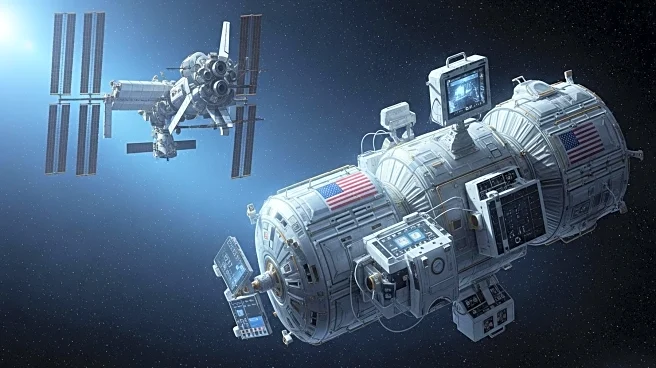What is the story about?
What's Happening?
NASA is conducting significant research aboard the International Space Station (ISS) to address health issues caused by microgravity, particularly focusing on head and eye pressure impacts. The research involves using specialized medical hardware, such as a thigh cuff, to counteract fluid shifts that can lead to vision changes and symptoms like 'puffy face.' Flight Engineer Kimiya Yui from JAXA is leading the study, testing the device on NASA Flight Engineer Mike Fincke. Additionally, NASA Flight Engineers Jonny Kim and Zena Cardman are managing cargo operations from a SpaceX Dragon spacecraft, which includes human research experiments and life support hardware. The Dragon also delivered a reboost kit to maintain the ISS's altitude, with plans to fire its Draco engines in September. The crew, including Roscosmos cosmonauts, practiced emergency procedures for scenarios like ammonia leaks and fires.
Why It's Important?
The research and operations conducted on the ISS are crucial for ensuring the health and safety of astronauts on long-duration missions to the Moon, Mars, and beyond. Understanding and mitigating the effects of microgravity on human health is essential for future space exploration. The reboost kit delivered by the Dragon spacecraft is vital for maintaining the ISS's operational altitude, ensuring the station remains a viable platform for scientific research and international collaboration. The emergency drills enhance crew preparedness for potential hazards, safeguarding the lives of astronauts and the integrity of the ISS.
What's Next?
NASA plans to continue its research on microgravity's impact on human health, with real-time monitoring by doctors on Earth. The Dragon spacecraft's Draco engines are scheduled to fire in September to reboost the ISS's altitude, demonstrating the effectiveness of the new propellant system. The ongoing collaboration between international space agencies will further advance scientific knowledge and technological capabilities, paving the way for future missions to the Moon and Mars.
Beyond the Headlines
The advancements in space health research have broader implications for medical science, potentially leading to innovations in treating fluid-related health issues on Earth. The collaboration between NASA and international partners highlights the importance of global cooperation in space exploration, fostering peaceful relations and shared scientific progress. The successful implementation of the reboost kit could set a precedent for future spacecraft designs, enhancing the sustainability of long-term space missions.















